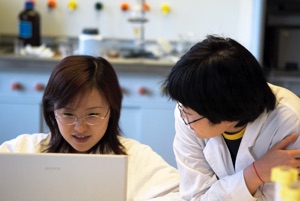Best Practice – a case study of a successful international study program between a Danish and a Vietnamese university
IBEN JENSEN
The aim of the project was to follow an international study program, which was considered successful by all partners – the students, the advisors and the funding organization.
The research questions were related to a mapping of everyday practices in the study program in order to examine: Which practices did create positive results? And which practices were just handled constructively?
The case was funded by Danida. It was hosted at Chemistry at Roskilde University and at Chemistry at University of Vietnam, Ho Chi Minh City. The students (who were all working as teachers at the university) held bachelor degrees in Chemistry and were suggesting topics of interests for their Danish supervisors’ research. The students spent one semester in Denmark, and in this period they made all their experiments for their theses. In the next semester they went back to Vietnam and finished their theses. Many of the students wrote an international article together with their supervisor after their dissertation.
The theoretical position in the project was a so-called postcultural perspective based upon reconceptualization of intercultural communication from the perspectives of practice theory and intersectionality. A postcultural perspective offers an opportunity to compare practices in international education rather than define people by their national history or belonging. The postcultural perspective is developed with this project as one of its empirical data (Jensen 2011).
The research project is a qualitative survey including five supervisors, six core students from the project and four students in related positions. The students were interviewed both individually and in groups in Denmark as well as in Vietnam. The supervisors and leaders of the project in Denmark were interviewed individually. Data was analyzed from a postcultural perspective and the following practices were selected: a) hosting, b) supervision/teaching, c) academic results. These practices were discussed from a perspective of power as well.
The main finding is that the study program was a success because it was relevant for students as well as supervisors and both partners got a personal and professional outcome. However, the success was also related to general changes from ’normal practices’. 1) The supervisors (especially the leaders of the program) acted like hosts. They were picking the students up in the airport, they invited them home, etc. 2) The supervisors guided their Vietnamese students a bit more, and the students accepted the supervisors invitations to a more ‘equal relationship’. 3) The students accepted the discourse of the problem orientated work in Denmark and described their academic output in relation to pedagogical differences, processes and learning styles. However, back in Vietnam all students primarily described their professional output in relation to new technology.
The axes of power, which formed this project, was first and foremost related to Danida as the donor of the project. The economic differences between Denmark and Vietnam are major. The relationship practices between supervisors and students were very different in the two countries, and the study shows quite different ways to handle the student-supervisor relation.
Summing up, the study points to how practices are negotiated and changed in international education, and how relevant additional studies of the actual use of ‘going abroad’ are.
Tange, Hanne og Iben Jensen (2012). “Good teachers and deviant learners? The meeting of practices in International education”. Journal of Research in International Education, vol. 11, nr. 2, August 2012: 181-193. (1). (The project has been inspiring for this article although it is not specificly mentioned).
Jensen, Iben (2011). ”Postkulturel kommunikation – fordi kultur ikke altid er vigtigst”. [Postcultural Communication – because Culture might not be the most important issue] I Tomas Sundnes Drønen, Kjetil Fretheim og Marianne Skjortnes, red.: Forståelsens gylne øyeblikk: Festskrift til Øyvind Dahl. Trondheim: Tapir, Akademisk forlag. (The project has been central in the construction of the concept postcultural communication).
Jensen, Iben (forthcoming 2012). ”Challenges in intercultural communication research” peer reviewed article in “Theoretical Turbulence in Intercultural Communication Studies”, Anthology by researchers from Nordic Intercultural Communication, NIC 2011 conference. Edited by Saila Poutiainen. (Based upon a Keynotespeak
Jensen, Iben (forthcoming 2014). “Postcultural Communication; Reconceptualizing Intercultural Communication from the Perspectives of Practice Theory and Intersectionality.” Peer reviewed article will be submitted to Journal of national and Intercultural communication in jan. 2013.
Jensen, Iben (forthcoming march 2013). Examples from the study will be in the second edition of Grundbog i Kulturforståelse. [Introduction to Cultural Understanding] Samfundslitteratur.
Jensen, Iben (2012). “Challenges in intercultural teaching in Nordic Higher Education” conference paper to Nordic Intercultural Communication (NIC) Conference in November 2012.
Jensen, Iben (spring 2013). “Intercultural learning and capacitybuilding in international education”.The article will be submitted to Journal of Research in International Education in spring 2013.
”Methods in qualitative Intercultural Communication Research”, Keynote speak at Cult net Summerschool, Roskilde University, Juli 2011.
“Postkulturel kommunikation – fordi kultur ikke altid er vigtigst”, Keynote speak ved Svensk Netværk for Interkulturel kommunikation.
”Postkulturel kommunikation”, Keynote speak ved Festforelæsning for Øyvind Dahl; Forståelsens gylne øyeblik, Stavanger, September 2011.
Postcultural Communication, Paper presentation at Nordic Intercultural Communication (NIC), December 2011, Helsinki.
Abstract
Publications and Presentations
